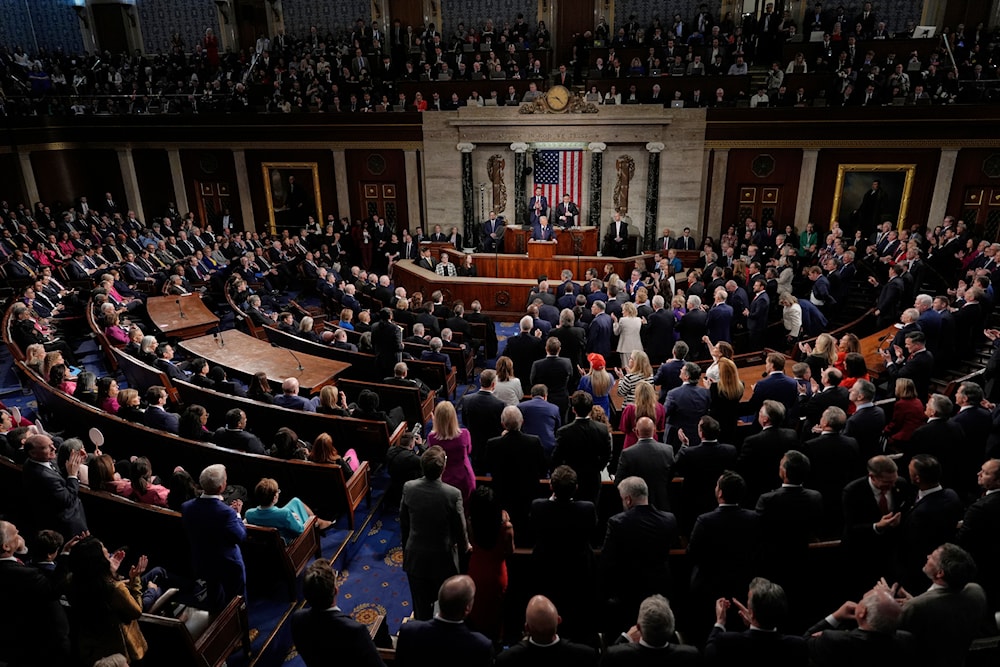US Congress moves to block Trump from launching war on Iran
US lawmakers introduce a War Powers Resolution to stop Trump from unilaterally attacking Iran, as fears rise over US involvement in the Israeli war on Iran, according to The Intercept.
-

Republican representatives stand while Democrats sit as US President Donald Trump addresses a joint session of Congress in the House chamber at the US Capitol in Washington, Tuesday, March 4, 2025. (AP)
As US President Donald Trump edges the United States closer to direct military confrontation with Iran, a bipartisan group in Congress is moving to prevent him from doing so without formal authorization, according to The Intercept.
On Tuesday, Representatives Thomas Massie and Ro Khanna introduced a War Powers Resolution that would bar the United States Armed Forces from engaging in hostilities against the Islamic Republic of Iran without Congressional approval.
As reported by The Intercept, the move mirrors similar legislation introduced in the Senate a day earlier by Senator Tim Kaine, amid growing alarm over the Israeli occupation's attacks on Iran, Tehran's retaliation, and Trump’s intensifying threats toward Tehran.
“The United States must not get dragged into another war in the Middle East without a full debate and vote in Congress,” Rep. Khanna told The Intercept, calling the potential for unauthorized involvement in “Israel’s” war on Iran a red line.
He emphasized the need to end the confrontation diplomatically and criticized Trump for circumventing established constitutional processes.
The War Powers Resolution of 1973 was intended to curtail the president’s unilateral authority to deploy troops without Congressional approval. However, presidents across administrations have repeatedly sidestepped the law. Massie noted that the House resolution is “privileged” and could be brought to the floor for debate and a vote within 15 days, as reported by The Intercept.
Rising fears over US move to aid 'Israel' in strikes
The effort comes as “Israel” has launched airstrikes on Iranian nuclear and military sites, sparking retaliation and raising fears of wider war. Trump has fueled those fears by issuing inflammatory posts on his social media platform, taunting Iranian leaders and calling for their “unconditional surrender.”
“We now have complete and total control of the skies over Iran,” Trump wrote, boasting about US military superiority. In another post, he claimed knowledge of the Iranian Leader’s location, suggesting he was a viable target, though stopping short of authorizing a strike “for now.”
According to The Intercept, Trump’s threats were followed by reports that he had discussed joining Israeli strikes on Iran’s nuclear infrastructure during a meeting in the White House situation room. Though no official decision was made public, the possibility of US involvement has unsettled members of Congress.
Rep. Khanna recently pressed Defense Secretary Pete Hegseth for clarity on whether the US would resist being pulled into a regional war by the Israeli occupation. Hegseth refused to offer such assurances.
Trump himself declined to address the issue while leaving the G7 summit in Canada, telling reporters, “I don’t want to talk about that.”
Lawmakers divided as some call for restraint, others for strikes
Congresswoman Summer Lee warned that Trump is using "Israel's" war on Iran to justify executive overreach, bypassing Congress and risking another catastrophic conflict.
She cited the US invasions of Iraq and Afghanistan as cautionary tales. “Millions have paid the price. We cannot allow Trump, or anyone, to use someone else’s war for political gain,” Lee stated, as reported by The Intercept.
However, her fellow Pennsylvanian, Senator John Fetterman, broke ranks. He dismissed Kaine’s Senate resolution and expressed support for military strikes on Iran.
“I’m going to vote it down,” Fetterman told Fox News, adding, “I really hope the president finally does bomb and destroy the Iranians.” His comments marked a dramatic reversal from 2022, when he criticized Trump for abandoning diplomacy with Iran.
Anti-war groups warn of ‘worse than Iraq’ consequences
Activists and analysts have sounded the alarm over the consequences of US intervention.
According to The Intercept, Samer Araabi of the Arab Resource and Organizing Center called the prospect of a US strike on Iran “horrifying,” warning it could be even more destabilizing than the Iraq invasion due to Iran’s population and military capability.
Clare Bayard of the Center for Political Education reiterated those concerns. “We have to challenge this country’s tendency toward amnesia,” she said, referencing the false pretexts used to justify the 2003 Iraq war, as reported by The Intercept.
“This push for war with Iran follows the same playbook.”

 4 Min Read
4 Min Read










